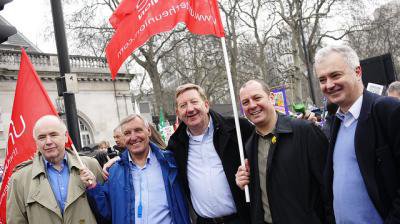As has happened time and time again, trade unions are being repressed and sidelined, the future of workers’ rights is put into question. How can the unions, and the people they represent, respond?

At the Labour Party Conference Len McCluskey the general secretary of Unite, Britain’s largest trade union, warned:
“If you push us further outside of the law, then be it on your own heads what the consequences are, because we’ve got no intention in Unite or in this movement of allowing laws introduced by the Bullingdon boys to restrict the legitimate and international rights we have to protect our workers… Conference, if we’re pushed outside of the law then so be it.”
Such public declarations may sound like radical and militant posturing, but considered in a historical context such sentiments can be seen more as a statement of fact than a statement of radical intent. Trade unions and the law have always had an uneasy and complex relationship.
As trade unions first began spreading at the end of the 18th Century, the first Combination Act was introduced by the government in 1799, making trade unions and collective bargaining illegal, these laws were repealed briefly in 1824, but following a wave of strikes a new Combination Act was brought in just a year later, largely banning union activities. In fact unions were not decriminalised in the United Kingdom until 1867 and weren’t actually legalised until 1871.
However, repression did little to limit the growth of trade unions during this period; the most famous case of this repression back firing was the Tolpuddle Martyrs. In the 1830s a group of agricultural labourers grouped together and refused to work for less than 10 shillings a week, however, in 1843 they were found guilty of having broken a law which prohibited the swearing of oaths and were transported to Australia as punishment. However, following huge protests and a petition signed by 800,000 people the establishment caved in and pardoned the martyrs. Indeed the legal repression of unions had done little to stem the tide of industrial strife and this period saw an explosion of huge strikes such as ‘1820 Scottish Rising’ and the ‘1831 great strike’ in the north-eastern coalfields.
Eventually, the establishment came to see legal repression of unions as not only ineffective, but also counterproductive. The repression had the effect of transforming the working classes’ modest economic grievances into what was viewed as dangerous political radicalism. ‘Responsible’ trade unionism – which made moderate demands for better wages and did not question the managerial prerogative – came to be seen as preferable to the uncontrollable outpourings of rage, such as the Luddite Insurrection and Swing Riots in the early 19th Century, and explosive political uprisings, such as the Paris Commune in the late 19th Century. Trade unions also had the benefit of concretely tying workers’ interests (increasing wages) to the firm’s interests (increasing profitability).
An investigation of the origins of trade unions highlights how legally restricting union activities cannot placate workplace discontent, for unions are not the originators of such discontentment, but are rather themselves an effect of a much deeper dynamic. Injustice in the workplace leads to a sense of moral outrage amongst the workforce and this can coalesce into a collective identity the formation of unions. But if trade unions are prevented from forming, this outrage will inevitably manifest itself in other, less visible, forms of resistance such as informal slowdowns, vandalism and theft of firm property and higher labour turnover – all of which are detrimental from an employer’s point of view. But repression is also politically counterproductive as it can lead to radicalisation, for the original injustice is amplified by the further injustice of repression while a route for the voicing of grievances and venting the anger is simultaneously closed off.
In the 1980s Thatcher began to curtail union rights, but many unions, especially after the failure of the 1985 miners’ strike, responded by attempting to continue to integrate their members’ interests with those of the employers. This was attempted by concessionary bargaining and partnership and led to a constant undermining of workers faith in the efficacy of unions. History indicates that the only way that a more hospitable legal environment is likely to be granted is if it is seen by the establishment as a lesser evil than repression and this requires unions to act beyond the law as they did for much of the first century of their existence.
Len McClusky is correct to warn of the ‘consequences’ for capital of legal repression, but if Unite hopes to end this repression words alone will not be sufficient. History suggests that Unite must carry through its promise to undertake ‘civil disobedience’ and demonstrate that repression causes capital more problems than it solves. In the US, where manipulation of labour law by employers has made it virtually impossible for workers to unionise, Walmart workers have formed an new kind of labour organisation which is an association rather than a union and which draws upon social media, participatory decision making and community alliances in order to influence Walmart through direct action rather than bargaining. For example, last month Walmart workers organised successful direct actions in 15 cities, leading to 100 arrests. This kind of accomplishment shows that new kinds of labour mobilisation are possible if unions go beyond the traditional limits of the law.
Note: This post was originally published on opendemocracy.net on the 26th September 2013.
